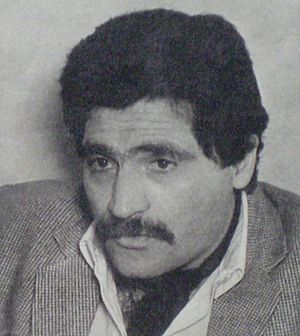Jorge Asís facts for kids
Jorge Cayetano Zaín Asís (born March 3, 1946, in Avellaneda) is an Argentine writer, journalist, and politician. He became well-known in the 1970s for his daily newspaper columns and his novels. His books often explored the lives of young people, politics, and the daily experiences of working-class people in Argentina. Later, he became involved in politics and held several important roles in the government of Carlos Menem.
Contents
Biography
Early Life and Writing Career
Jorge Asís was born in Avellaneda, a working-class area near Buenos Aires. His family had come from Syria. From a young age, he was very interested in books and political activities.
One of his first important books was Los reventados (which means "The Down-and-Out"). This story was about different people trying to make money when Juan Perón returned to Argentina in 1973. Some characters in the book saw the events of June 20, 1973, at Ezeiza International Airport, which is told from their point of view.
During the 1970s, Jorge Asís wrote a daily column for the newspaper Clarín. He used the pen name Oberdán Rocamora. In 1978, he even reported from a car rally in South America, where he was a co-pilot in a Citroen car.
Becoming a Famous Author
Asís became very famous in 1980 with his book Flores robadas en los jardines de Quilmes ("Flowers Stolen in the Gardens of Quilmes"). This book followed the adventures of young people in Argentina during the 1970s as they explored careers and politics. It focused on the narrator's relationship with a young woman from Quilmes who eventually left the country. The book was dedicated to Haroldo Conti, a writer who had disappeared during the time of the military government. The book also included strong political ideas for that time.
Flores robadas en los jardines de Quilmes was the first part of a series called Canguros (meaning "Kangaroos"). This series looked at everyday life in the larger Buenos Aires area.
In 1984, Asís released Diario de la Argentina ("Argentina's Newspaper"). This book was a fictional story based on his experiences at the Clarín newspaper. Some major newspapers were not happy about their internal issues being shared publicly, so they did not promote Asís's work for several years.
Involvement in Politics
In the 1980s, Jorge Asís became more involved in politics. He often met with people who worked in intelligence, and these meetings inspired his 1987 novel Partes de inteligencia ("Intelligence Reports"). During Raúl Alfonsín's time as president, Asís supported the Justicialist Party and especially Carlos Menem for president.
When Carlos Menem became President of Argentina in 1989, Asís was given several government and diplomatic jobs. He served as ambassador to UNESCO, Secretary of Culture, and ambassador to Portugal.
After Menem's ten years as president, Asís continued to be active in politics. He became a popular commentator on TV, radio, and in newspapers. He was known for his lively language and unique style. In the 2007 presidential election, Asís ran for vice president alongside Jorge Sobisch. Their team finished in sixth place, getting about 1.6% of the national vote.
Some people thought that the realistic style of his early books, especially the success of Flores robadas en los jardines de Quilmes during the military government, meant he was supporting the regime. His writing style has been compared to the realistic novels of the 1800s.
Books
Novels
- La manifestación (1971)
- Don Abdel Zalim, El burlador de Domínico (1972)
- La familia tipo (1974)
- Los reventados (1974)
- Flores robadas en los jardines de Quilmes (1980)
- Carne Picada (1981)
- La calle de los caballos muertos (1982)
- Canguros (1983)
- Diario de la Argentina (1984)
- El pretexto de París (1986)
- Partes de inteligencia (1987)
- Cuaderno del acostado (1988)
- El cineasta y la partera (y el sociólogo marxista que murió de amor) (1989)
- La línea de Hamlet o la ética de la traición (1995)
- Sandra, la trapera (1996)
- Lesca, el ... irreductible (2000)
- Del Flore Al Montparnasse (2000)
- Excelencias de la NADA (2001)
- Cuentos Completos (2005)
- Hombre de Gris (2012)
- Casa Casta (2012)
- Tulipanes salvajes en agua de rosas (2012)
- Dulces otoñales (2014)
- Memorias tergiversadas (2017)
Short Stories
- La manifestación (1971)
- Fe de ratas (1976)
Poetry
- Señorita vida (1970)
Non-fiction
- El Buenos Aires de Oberdán Rocamora (1981)
- La Ficción Política (1985)
- La Marroquinería Política (2006)
- El Descascaramiento (2007)
- La elegida y el elegidor (2008)
See also
 In Spanish: Jorge Asís para niños
In Spanish: Jorge Asís para niños


